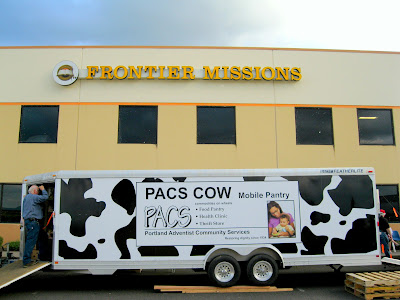Rediscovering self-worth: Bill's Story
“I don’t think I’d ever before worked in an environment
where I felt like everybody liked me,” said PACS volunteer Bill Leissner.
“It’s really quite heavenly, literally, to be able to go to
a place where you know that people appreciate you, and they’ll go out of their
way to appreciate you, and if you stick around long enough, you know it’s not a
lie.”
Bill credits his time at PACS for helping him rediscover his
workplace skills and sense of self-worth, but the process of getting there
wasn’t free of challenges.
Prior to 2001, Bill had always held down a job. He had shot
3500 rolls of film as a professional photographer in Austin, Texas. He had worked
as a Network Administrator in New York. But shortly after the terrorist attacks
of September 11, 2001, Bill experienced a mental health crisis. While he had
relocated to Vermont a few months before that event, he had multiple friends
who were impacted, including a firefighter who lost his life after going into
one of the towers multiple times to help save others. Bill sank into a deep
depression, and eventually found himself unemployed and increasingly isolated.
In 2014, Bill was placed at PACS by a worker re-training program.
He filled a badly needed volunteer role, interviewing and processing people who
came to PACS for help with food.
“He was very smart, I could tell that right off,” said Traci
White, Client Services Manager and Bill’s supervisor at PACS. “He was intelligent,
he understood computers, and he was very interested in people.”
Because of Bill’s computer knowledge, he was immediately
able to help other volunteers with the computer database. But it was also
apparent that his social and collaborative skills needed rehabilitation.
“He was very sensitive at first, and easily rattled,” said
Traci.
"If you become disabled, if you become somewhat
isolated, your social skills can kind of stagnate,” said Bill. “I was cautious.
I was rough around the edges. I was not particularly trustful of other human
beings at that point.”
It took time and patience for Bill to learn to trust and
engage with people again in a productive way.
“I felt a general sense of pessimism and futility about my
life, so it took a while for me to become receptive. Its sort of like they tell
you, before you wash your clothes, if they’re really dirty let them soak first.
I went through sort of a soak cycle, and it took me awhile to really be able to
take in the kindness and support that was available.”
Traci was patient but proactive in working with Bill, and
with additional counsel from PACS Executive Director Paul L. Cole, a sense of
trust began to develop.
“Bill started to really trust me, and it got to the point
where I could trust him,” said Traci.
“She was very honest about ways I could improve in the
interest of being of better service to our mission and our clients,” said Bill.
“That’s practical, real-world experience.”
Traci was able to challenge Bill constructively, while also
providing a safe environment. It paid off.
“It provided a very kind and nurturing environment for me to
go through that transformation,” Bill said. “It’s very skillful. You love
people, you build up their trust, and then you tell them the truth.”
The fact that Bill’s work involved helping others also had a
positive impact on him.
“I talked with numerous clients,” said Bill. “Single mothers
who were living in a car with two children; people with horrible health
problems, mental health problems, financial problems; people who’d come in who
are refugees from horrible, unimaginable civil wars and famine. PACS is a
refuge for the people who come there, and it was a refuge for me that enabled
me to recover from some challenges I had. A lot of the clients have helped me
as much as I helped them. They faced challenges much more difficult than I ever
had.”
The impact of his work helped Bill feel better about his
life, and inspired him to do more to improve his own situation.
“We become better at taking care of ourselves by taking care
of other people,” he said.
In July of 2016, Bill found his first paid, unsubsidized
employment in years. As a Peer Support Specialist, he joined a growing field of
health care that is getting excellent results and proving to be very
economical.
“It’s a magnificent thing to turn a disability into an
asset,” said Bill. “I provide social support and recovery support to other
people with disabilities like mine, and they report back to me that I help
them, and for me that’s what life is all about. If I have value to other people
it gets me out of bed in the morning.”
Bill also continues to volunteer at PACS once a week.
“I come to PACS, a space that is a familiar environment, and
I continue to develop and practice the skills that are essential to being
employed.”
Bill is very grateful for the patience, kindness, and
training he received, and continues to receive, as a volunteer.
“It’s a transformative environment, not only for the people
who get services there, but also for the people who provide services,” said
Bill. “There’s a sign I walk past every day that says, ‘Treat everyone with
politeness, even those who are rude to you, not because they are nice, but
because you are.’ It really sums up the philosophy that is practiced at PACS.”
Bill says things would be very different for him if he had
never joined PACS.
“I don’t mean to be melodramatic, but I might not be alive,”
he said. “But I think, most importantly for me, I wouldn’t have the value and
the impact on the world and other peoples’ lives that I do. PACS facilitated my
value to other peoples’ lives,” he said. “That’s priceless.”

.png)


Comments
Post a Comment